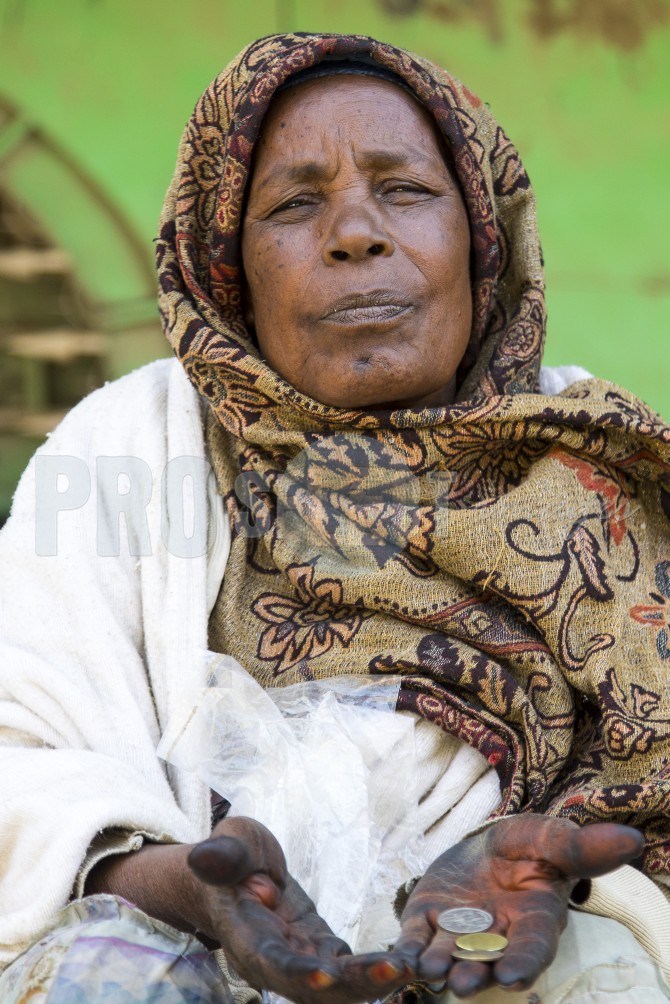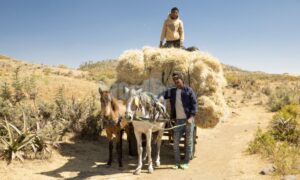Description
Mekele Ethiopia beggar
Therina Groenewald: Mekele Ethiopia beggar – Professional photography
Famous for beggars
Ethiopia is more famous for its beggars than anything else. If you ask any tourist or foreigner what they remember about Ethiopian people: “Beggars” is the answer in most cases. Young, old, children, men, women all beg shamelessly on a day light as if it is an acceptable social activity. And the rest of the society doesn’t seem to mind since it will give them money or food.
In addition to those who officially take begging as a career, there are many who depend on their family and relative for a living. Especially in a family where siblings, close relatives or parents are in Europe, US or Middle East. Then working doesn’t seem to have much of an importance.
Own comfort zone
In addition to individuals, the government has its own comfort zone in depending on others when it comes to survival. For example, recently, the Council of Ministers endorsed an unprecedented budget of over 117.8 billion birr for approval to the House of People’s Representatives for the 2011/12 fiscal year.
It was announced that while over 60 billion birr of this total budget will be sourced from local resources, the remaining, almost half of it, is expected to be mobilized in the form of loans and grants from Ethiopia’s international partners.
There is even a saying in Ethiopia nowadays that even the government itself is a beggar. The goverment is also economically dependant. So there is no need to be surprised by the number of individual beggars in the country. Anyone of us can be a witness on the fact that getting a grant is breaking news in Ethiopia. This is not to disregard the government’s effort to fulfill the countries needs. Rather, it’s to highlight how big the problem of dependency is in Ethiopia.
Begging and economic dependency in Ethiopia is increasing
The scary thing is, instead of declining, begging and economic dependency in Ethiopia is increasing at alarming rate with sophisticated style. In addition to countless number of citizens you see on the street begging, we are having expert beggars who invest time, skill and money to create ways of deceiving the public.
Just a couple of months back, outside one church, a few young men were crying with a coffin in front of them claiming that their friend died that morning and they don’t have money to send his body to his parents who they say lived in Tigray. Everyone who passed by that road that morning gave them money and cried for the poor man who died this way.
Finally, the police, considering it was immoral to use a dead body like that, asked them to move the coffin away. When they tried to pick it up it wasn’t as heavy as the police expected it to be. The suspicious police asked them to open it and it was empty.
You can imagine how many hours these people thought of creating such a scam. They bought a coffin, they cried all morning just to trick the public. I think this is the direction we are heading when it comes to begging.
Begging and economid dependency
Begging and economic dependency on the uphill struggle of others is understandably a complex issue in Ethiopian context. It has a religious, cultural, historical, political and economic elemnts which makes it difficult to find a clear cut point that will satisfy everyone.
In addition, the fact that the issue is wide and deep might make it difficult to be assessed in a short article like this one. However, taking the seriousness of the problem into account, it must be discussed by raising the right questions as often as possible and to come up with solutions.
Is poverty the sole reason for people to engage in begging and want depend on others?
The answer to this question may help explain whether we can justify the fact that a considerable number of working people in the country is economically dependant as a result of the massive poverty in the country. Poverty is the reason many beggars use to justify their action. Farmers refer to the twisted land policy that left them landless, or to the weather that they say is not suitable for agriculture as a result of climate change. The city beggars talk about lack of employment opportunities, infrastructures, education and training and etc. which is directly or indirectly related to poverty.
Social crises
However, there is a strong reason that poverty cannot be the sole reason for these social crises. To see this, we don’t have to go far. Each and every day we witness people in the same situation as the beggars or dependants work hard to survive and live as dignified life as possible. I am certain that most of us know persons with physical disability or incurable diseases who work and fight to stand on their won two feet, young boys who shine shoe, girls who work as daily laborers, and some people despite having a family abroad work to make something of their own every day.
This is not to indicate poverty doesn’t play a role. Rather, it is to point out that its role might not be as significant as we might think.
Then, what is the main reason that makes people in Ethiopia beg and rely financially on others? There may not be easy answers to this question. One may list many societal factors that may have contributed to this phenomenon. And these factors may have been in play for generations to create the situation we have today. One may raise issues of culture, morality, religion, the question of individual self-worth in our society, etc. We may not know for sure.






Reviews
There are no reviews yet.